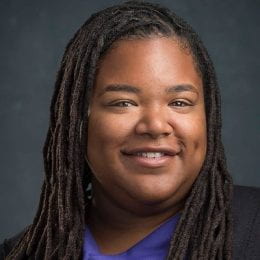In this special blog series, Leadership Communication doctoral student Jurdene Coleman considers how academic frameworks, research agendas, and the associated leadership studies literature contributes understanding and support to the exercise of leadership during the COVID-19 outbreak locally. 
COVID-19 is presenting our nation with countless adaptive challenges; public education is no exception. Adaptive challenges differ from technical problems in many ways. First a technical problem, while it may be complex, has an identifiable solution. An example in public education might be choosing which math curriculum to implement. Next, technical problems can be solved by an entity with the right expertise and using a known process for problem solving. If we keep with the curriculum adoption example, we typically have teachers volunteer to use one of several curricula and give feedback to administrators who then bring the final recommendation to the school board. Adaptive challenges on the other hand, can only be addressed through changes in people’s priorities, beliefs, habits, and loyalties (Heifetz , Grashaw & Linskey, 2009). Adaptive challenges require an organization to go beyond any authoritative expertise to mobilize discovery, shed certain entrenched ways, tolerating losses and generating the new capacity to thrive anew (p. 19). The new adaptive challenge is what does education in USD 383 school district look like without our classrooms and school buildings?
Adaptive challenge vs. technical problem
| Kind of Change | Problem definition | Solution | Locus of work |
| Technical | Clear | Clear | Authority |
| Adaptive | Requires learning | Requires learning | Stakeholders |
Adapted from FIGURE 2-1 Distinguishing technical problems and adaptive challenges, The Practice of Adaptive Leadership
Leadership at the school board table encompasses primarily technical problems addressed from a 40,000-foot view above the district. However, with the arrival of COVID-19, we have had to adjust our lens and we now operate just a few thousand feet above the district. This new view means we are now laser focused on the details of what happens between teacher and student. With several board members also being parents, their dual relationship with the district as director and consumer, increases our collective concern over how education will be delivered. These roles change the lens through which we each see the challenge. That dynamic perspective is key to being able to address adaptive challenges.
The Continuous Learning Plan, created by the USD 383 district administrative team, outlines how our students’ education will look for the remainder of the semester. It is a dynamic document, that has been reviewed at every board meeting since its creation and it continues to evolve, which is what we expect. As the school board continues with its normal operations, we are now spending increased deliberative time on the continuous learning plan. What does that look like in real life? It means increased frequency and length of board meetings. It means asking questions that we typically don’t ask – why this choice, what is getting in the way of executing the solution, what other options exist and how did you come to choose this one, how do we know this is working, what will we do if it isn’t, how can we maintain this long term?
None of these questions have simple answers. They require a shift by not only the board members but also by the district administrative team and teachers. These questions and the many more that will be generated over the next six months will be addressed through adaptive leadership practices so that we can change the status quo practices of education, experiment with solutions, and most importantly expand our capacity to thrive as a district. Manhattan-Ogden schools will thrive through this pandemic. To do that, we must challenge ourselves to go beyond what education has been to what education can be. There is no book we can reference or expert we can web call into our meetings to outline the steps of navigating a pandemic and moving 14 buildings of students and staff to an online education plan that we are creating from the ground up. We are the experts in our own new normal.
We are on day 36 of this journey to the end of the semester, our first benchmark. Our plans continue to evolve, our discussions continue to be richer and more engaging. We are practicing adaptive leadership. We do not know where we are headed but we do know that we will only get to the finish line together.
Below readers can find additional resources helpful to making progress on adaptive leadership challenges.
Heifetz, R., Grashow, A., & Linsky, M. (2009). The practice of adaptive leadership.
Uhl-Bien, M. and Arena, M. (2018). Leadership for organizational adaptability: A theoretical synthesis and intergrative framework. Leadership Quarterly,
Chrislip, D and O’Malley E. (2013). For the common good: Re civic leadership, KLC Press.
